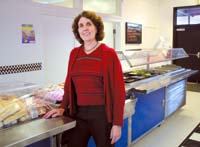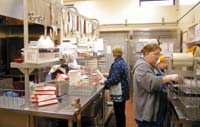Safe or sorry?
Lucia Mar Unified School District plans to serve irradiated beef in school lunches beginning in January
BY SHAWNA GALASSI
PHOTOS BY CHRISTOPHER GARDNER

Ground beef zapped by high doses of gamma rays will likely be served
to students purchasing lunches in the Lucia Mar Unified School District
in 2004.
The U.S. Department of Agriculture is touting irradiation as a safe and effective means of controlling E. coli and other food-borne bacteria, and plans to offer it through the National School Lunch Program beginning in January.
Judy Stephens, director of food services and purchasing for Lucia Mar, says she will buy the irradiated beef as soon as it is available. She is convinced that irradiated food is perfectly safe and so far has felt no need to query parents or notify them of her decision.
Nor is she required to notify them.
Curiously, the FDA requires irradiated meat sold in stores to be labeled, but there are no federal regulations requiring schools to disclose its use.
This does not sit well with critics of irradiation, such as the nonprofit groups Public Citizen and Food for Safety, who point to studies that show it can cause cancer and may have many other harmful effects, the scope of which won 't be evident for decades.
Lorraine Kitman, whose son attends Harloe Elementary in Arroyo Grande, is spearheading a drive to keep the irradiated beef out of Lucia Mar. She is incredulous that Lucia Mar plans to serve it when the Los Angeles Unified School Board voted unanimously to ban irradiated beef and San Diego Unified has indicated they have no plans to purchase it next year.
"This warrants further discussion, Kitman said. "At the very least, don 't buy it this year."
Kitman is particularly upset that the decision to purchase the irradiated beef was quietly made without consulting parents. The only reason she found out was because she called the district to find out its position after reading a work-related notice that said irradiated beef had been approved for schools.
"This warrants proactive discussion," Kitman said. "Here I am a parent having to bring it [the issue] to them. Had I not, there would have been no conversation. It would have just been happening."
After speaking with Stephens on the phone, Kitman said she was "alarmed by the sense she was so completely unwilling to admit there was any reason for concerns." It was then that Kitman made the decision to speak out.
"If I had gotten any sense she was taking my concerns and listening to them, I wouldn 't have felt I had to do something," Kitman said.
Kitman, who has mounds of material on irradiation, is concerned about studies she has read that show irradiation can cause genetic damage, tumor growth, and internal bleeding, among other things.
Due to Kitman 's concerns, the principal of Harloe Elementary, Juan Olivarria, arranged to have Stephens speak at a PTA meeting. But, according to Kitman, instead of advertising Stephens ' presentation in the PTA flier as a discussion on irradiation, the topic was presented as "Nutritional Information and School Meals" with only a small mention of irradiated meat. And no efforts were made to include parents from other schools in the district.

|
At the meeting, Stephens discussed her reasons for supporting the use of irradiated ground beef. Like many who favor it, she feels it is necessary to prevent a repeat of the 1992 E. coli outbreak at Jack in the Box that left three children dead and several hundred hospitalized.
"Our staff is educated and careful, but it only takes a little bit to cause problems," Stephens said.
She said irradiation has been studied for 50 years and the studies show it is not harmful to the food or to those who eat it. She likened the process to having teeth X-rayed or luggage put through an airport scanner. "Your teeth don 't become radiated any more than the food does. No residue is left behind."
Stephens feels that irradiation has "gotten a bad rap for nonscientific reasons," and that political activist groups have been "actively spreading misinformation and fear among consumers.
"I 'm concerned with people making decisions based on fear rather than scientific fact," she said.
But critics of irradiation can cite numerous studies that have proven the process unsafe, or at best warn that further research is needed. Some studies have shown that animals given irradiated foods exhibit a wide range of problems, including rare forms of cancer, genetic damage, organ malfunctions, and vitamin deficiencies.
Those opposed to irradiated food are also concerned that the process causes the formation of "radiolytic products" that are produced when food is irradiated. Radiolytic products are chemicals that do not naturally occur in food and are thought by many to be carcinogenic.
In his book "Understanding the Dangers of Food Irradiation," Dr. Gary Gibbs warns that formaldehyde and benzene, two such chemicals, have been linked to cancer. He asserts that exposure to formaldehyde has been shown to cause cancer in animals and benzene has been associated with an increased incidence of leukemia.
Gibbs refers to a 1970s study in India in which malnourished children were fed irradiated wheat. Within one month, 80 percent of them developed abnormal white blood cells associated with leukemia.
This does not bode well for the scores of malnourished children from low-income families who rely on subsidized school lunches.
Studies also show that irradiation diminishes the nutritive value of foods. Once again, this directly impacts low-income children who have no alternative to school lunches and are often most in need of maximally nutritious meals.
While Stephens and other supporters of irradiation take comfort in the fact that it is endorsed by the FDA and the USDA, detractors are quick to point out that consumers have been misled in the past.
 |
"For years women were told estrogen was safe, now we 're told it 's bad for women. And for years we were told tobacco was safe," said Carmela Vignocchi, a retired school administrator.
Vignocchi said she is concerned that Lucia Mar plans to serve irradiated meat to school children when there hasn 't been adequate research or information about what effects it will have on their development.
"I don 't think children should be used as lab experiments," she said.
Vignocchi said she intends to take the matter up with the school board.
Ann Steele, a substitute teacher who objects to Lucia Mar 's decision, said she too will approach the school board.
"You want only the best items being consumed by a growing body," Steele said. "The best quality, color, presentation. Irradiated meat is not up to that quality."
Steele is familiar with studies showing that irradiation is patently unsafe.
"I think it 's very dangerous in the sense we 're not going to have children ill suddenly," Steele said. "But at some point in these children 's future they will experience some sort of health deterioration."
Tracy Lerman, an organizer for Public Citizen 's Stop Food Irradiation Campaign, says that irradiated beef is being served in the schools because of pressure from food irradiation companies and food industry lobbying groups.
According to Lerman, consumers have rejected irradiated beef sold in grocery stores, so now schools are being targeted. She said that Sen. Tom Harkin, who hails from Iowa, a state with two large irradiation facilities, inserted a two-paragraph measure onto the end of a 1,200-page farm bill allowing for the sale of irradiated beef to school districts.
"I believe the measure got into the farm bill because this provides them with a humongous market," Lerman said. "It [irradiation] doesn 't have to be disclosed in schools. They don 't have to worry about consumer acceptance."
(An assistant at Sen. Harkin 's Washington D.C. office confirmed that he did insert the measure and Iowa does have two irradiation facilities.)
A check on four other school districts in the area revealed that as of yet none have decided to purchase irradiated ground beef next year. Louise Mayhew, assistant director of Food Services for Atascadero Unified, said there haven 't been enough studies on it.
"I know they say it 's not harmful, but I think it 's too much of an unknown," she said. "You know how the FDA is. They say, 'Oh, it 's safe. ' And then they say, 'Oh no, it 's not safe. ' I 'd much rather go with the tried and true."
The food service directors for San Luis Coastal, Coast Unified, and Templeton all said they need more information before going in that direction.
Rod Blackner, the director of Food Services for Paso Robles, said the district already has its allotment of ground beef for the year, but they would have no problem serving irradiated meat.
"It 's very acceptable," he said. "In fact, it 's probably something we should do. It 's a more responsible way to work with ground beef."
If they do decide to use irradiated ground beef, Blackner said they would not notify parents.
"We don 't see it as an issue," he said.
And for some parents it 's not an issue. Beverly Beaudoin, whose son attends Harloe Elementary, said she is all for schools serving irradiated ground beef.
"I would rather take chances with hamburger passed through a process than bury my child from eating a hamburger that had E. coli," she said.
But she does think parents should be informed that irradiated ground beef is being used.
"Someone who may object to it should know so they have the option of packing a lunch," she said. "Not telling anyone and just serving it up is skirting the issue."
Lerman suggests that parents who object to irradiated food being served in their school district contact the principal of their school as well as the food service director for the district and the school board. She also urged parents to write their elected officials.
"Let them know this is something you don 't want your kids to eat," she said. "Unfortunately [parents] have to protect children from school lunches."
For those interested in more information, Kitman will have an informational table at the We the Planet Tour at Cal Poly, Nov. 9 at 6:30 p.m. She will also be gathering signatures for a petition calling for a moratorium against irradiated meat in SLO County schools. For more information, call: 471-3698. ³
Contributing writer Shawna Galassi doesn 't serve her family food
that glows in the dark.